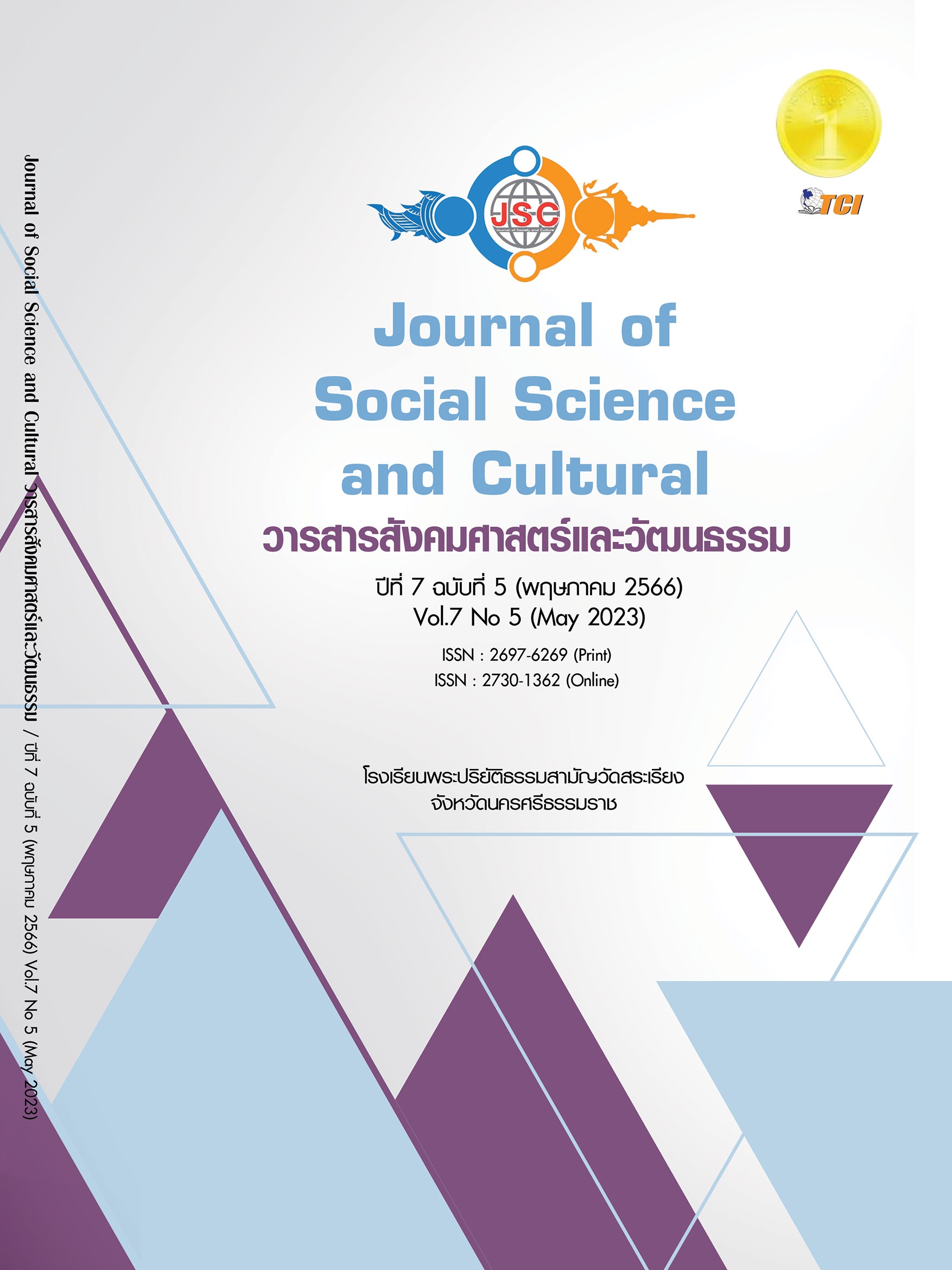THE FACTOR ANALYSIS OF MANAGEMENT MODEL OF MEDIUM-SIZED AGRIBUSINESS FOR SUSTAINABILITY
Main Article Content
Abstract
This research aimed to analyze confirmatory factors and to examine the consistency of the management model of medium-sized agribusiness for sustainability. The data were collected via a questionnaire distributed to 150 business owners and employees who were selected by purposive sampling. Data analysis utilized descriptive statistics were mean and standard deviation (S.D.), analysis of confirmatory factors. The reliability was .91. Research findings indicated that 1) the average scale of the questionnaire results were high in all aspects; 2) the management model of medium-sized agribusiness for sustainability consisted of 4 factors which were knowledge building factor (rating scale=0.904), transformational leadership factor (rating scale= 0.975), business relations factor (rating scale= 0.991) and community relations building factor (rating scale= 0.977); all factors were statistically significant at the .05 level; and 3) the consistency of the management model of medium-sized agribusiness for sustainability and the empirical data of confirmatory factors were consistent at Chi-square 2=142.89, df = 146, p = .557, AGFI = 0.92, RMSEA = 0.00, SRMR = 0.03 and group comparison index CFI=1.00. When considering the consistency criteria, the results indicated that the medium-sized agribusiness management model for sustainability was consistent with the empirical data.
Article Details
References
คณะกรรมการอาชีวศึกษา. (2556). ความรู้ทั่วไปเกี่ยวกับธุรกิจทางเกษตร. เรียกใช้เมื่อ 20 มีนาคม 2566 จาก https://slideplayer.in.th/slide/1879327/
จักรพงษ์ นวลชื่น. (2561). แนวทางการพัฒนาวิสาหกิจขุมขนให้ยั่งยืนด้วยภูมิปัญญาท้องถิ่นศึกษากรณีวิสาหกิจชุมชนในจังหวัดนครพนมและจังหวัดสกลนคร. เรียกใช้เมื่อ 19 มีนาคม 2566 จากhttp://www.dsdw2016.dsdw.go.th/doc_pr/ndc_2560-2561/PDF
ชุติมา หวังเป็ญหมัด และธนัซชา บินดุเหล็ม. (2557). ปัจจัยแห่งความสำเร็จของการประกอบการธุรกิจขนาดกลางและขนาดย่อม (SME) ในอำเภอหาดใหญ่ จังหวัดสงขลา. วิทยาการจัดการ, 1(1), 26-39.
ดวงกมล คิริยงค์. (2555). รูปแบบและกลยุทธ์ในการดำเนินธุรกิจขนาดกลางและขนาดย่อมของไทยเพื่อเพิ่มศักยภาพและขีดความสามารถในการแข่งขันอย่างยั่งยืนศึกษาเฉพาะ 4 ธุรกิจ SME ที่ผ่านเข้ารอบสุดท้ายในรายการ SME ตีแตกเพื่อชิงรางวัลสุดยอด SME แห่งปีประจำปี 2554. ใน วิทยานิพนธ์ปริญญามหาบัณฑิต สาขาการประกอบการ. มหาวิทยาลัยศิลปากร
บุญชม ศรีสะอาด. (2556). การวิจัยเบื้องต้น ฉบับปรับปรุงใหม่. กรุงเทพมหานคร: สุวีริยาสาส์น.
ปิยภรณ์ ชูชีพ. (2563). แบบจำลองความสัมพันธ์เชิงสาเหตุการสืบทอดทายาททางธุรกิจของธุรกิจครอบครัวในประเทศไทย. รังสิตบัณฑิตศึกษาในกลุ่มธุรกิจและสังคมศาสตร์, 6(2), 73-94.
วิรัช วิรัชนิภาวรรณ. (2559). แนวคิด ตัวชี้วัด ตัวแบบของการบริหารจัดการและการบริหารจัดการที่ยั่งยืน. กรุงเทพมหานคร: โฟร์เพช.
สำนักงานเลขาธิการวุฒิสภา. (2562). แผนปฏิรูปประเทศไทย. เรียกใช้เมื่อ 29 มีนาคม 2566 จากhttps://www.senate.go.th/view/181/%E0%B8%AB%E0%B8%99%E0%B9%89%E0%B8%B2%E0%B8%AB%E0%B8%A5%E0%B8%B1%E0%B8%81/TH-TH/
สำนักงานส่งเสริมวิสาหกิจขนาดกลางและขนาดย่อม. (2553). รายงานสถานการณ์วิสาหกิจขนาดกลางและขนาดย่อมปี 2552 และแนวโน้มปี 2553. กรุงเทพมหานคร: สำนักงานส่งเสริมวิสาหกิจขนาดกลางและขนาดย่อม.
สำนักงานสภาพัฒนาการเศรษฐกิจและสังคมแห่งชาติ. (2561). ยุทธศาสตร์ชาติ 20 ปี. เรียกใช้เมื่อ 29 มีนาคม 2566 จาก http://nscr.nesdc.go.th/ns/
สำนักงานสภาพัฒนาการเศรษฐกิจและสังคมแห่งชาติ. (2564). เป้าหมายการพัฒนาที่ยั่งยืน. เรียกใช้เมื่อ 27 มีนาคม 2566 จาก https://sdgs.nesdc.go.th/
Osterwalder, A. & Pigneur, Y. (2010). Business Model Generation. New Jersey: John Wiley & Sons.


